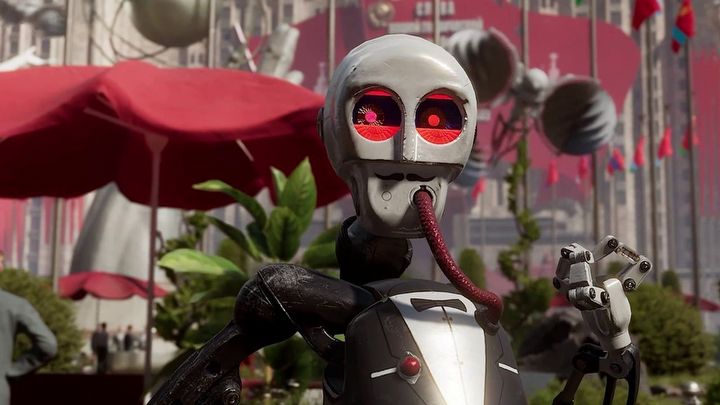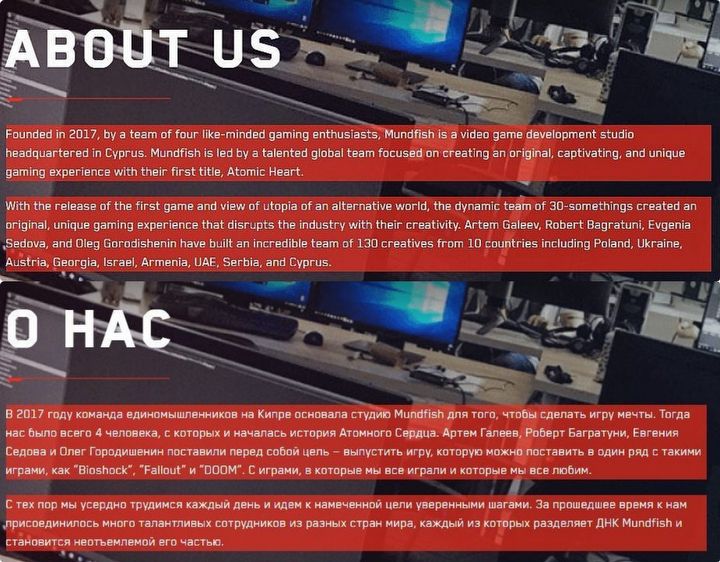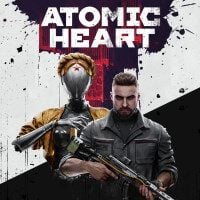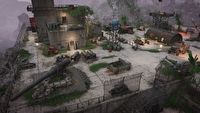Releasing Atomic Heart on Anniversary of Russian Invasion of Ukraine is Wrong
Is the release of a Russian-made game almost exactly on the anniversary of the Russian invasion of Ukraine a good idea? Hardly. Even considering that the date was probably chosen by the Western publisher, it comes across as a bad joke. But there is still a way to get this situation straight.
5
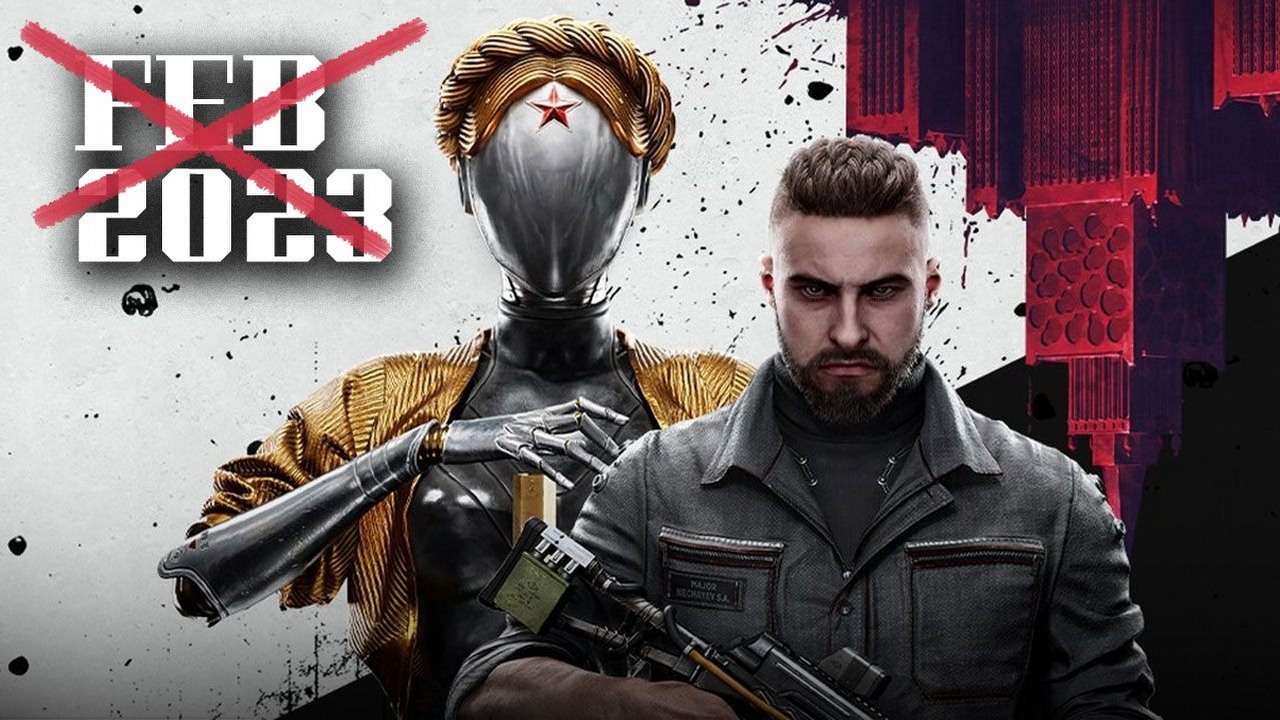
Atomic Heart has been captivating players for several years. No wonder: in the flood of Western titles, this Russian BioShock, as it was promptly dubbed, alures with Soviet-inspired retrofuturism, spectacular graphics, an interesting theme of the revolt of machines, as well as a very peculiar Eastern European flair.
People of flesh and blood work on the game – who knows, maybe it's even their lifetime achievement? Certainly, they have, over the years, gave their blood, sweat and tears and made various sacrifices along the way. Everything seemed to be going perfectly. The creators had already seen the finish line on the horizon (the title was supposed to be almost finished in mid-2021), and even the giants of the industry have noticed the potential in Atomic Heart (the game will be included in the Game Pass subscription on the day of its release). In February 2022, Mundfish studio announced that their game would launch later that year. And then, in the early hours of February 24, 2022, Russia launched a full-scale, genocidal, morbid invasion of Ukraine. Thousands of tanks, tens of thousands of troops, residential areas bombed every day, cities turned to rubble – this has been the reality of the people of Ukraine for almost a year. This is the biggest armed conflict in Europe since the fall of the Third Reich, and that says something about Russian dictator, Putin.
Was February 24 a black day in Mundfish's history? We don't know. We do not know the views of the game's developers; nor do we know what's their stance on their country's aggression against its neighbor. Maybe they approve of it, like many other Russians? Or maybe they're pissed off by this war because it interfered with the release of a promising game? Maybe they see it for what it truly is – a mad act of pure evil? We do not know this, because Mundfish studio responded to the controversy related to the upcoming premiere with a set of vague clichés, not sparing a word about the war. Admittedly, it defines itself in the online space as an "international team," which even includes Ukrainians (three of them work at the company). It's just a pity that you won't find a similar note in the "About" section of the company's Russian-language website.
However, we know something else. We know, for instance, who invested in the production of this game, and what budget is supplied by the taxes that Mundfish pays. And it's the exact same budget, of which 33% in 2023 are allocated to "internal security and national defence," which in plain language means waging war on foreign land. It is, of course, the budget of the Russian Federation.
Stinky connections
Unfortunately, in the case of Atomic Heart, doubts are surrounding not only the country of origin of the dev studio, but also the connections of this Russian company. Let's start with Mundfish investors. In 2021, it was announced that the studio had raised funds to produce the game from several sources. Among them, you will find two large companies with Russian roots.
Gaijin, creators of the well-known free-to-play War Thunder, is one of them. This company, unlike its biggest competitor, Wargaming, did not withdraw (even if only formally) from Russia – not even releasing a statement distancing it from the war. The only thing we heard was that the developers do not want "political discussions" to be part of their game. As a result, you can meet players in the game who decorate their vehicles with the infamous letters "Z" or "V;" symbols of the Russian war waged on the soldiers and civilians of Ukraine. Before the war, Gaijin also collaborated with an anti-Ukrainian YT channel linked to the Donetsk People's Republic, i.e. areas of Ukraine occupied since 2014 by the Russians, and formally incorporated in the Federation in the fall). These are not major accusations, but let's face it: the silence of the Russian studio is problematic.
The other Russian investor is GEM Capital. This company was founded by Anatoli Paliy, a longtime director of Gazprom's daughter company (Gazenergoseti). In addition to investing in gaming, GEM Capital is also involved in the Russian gas industry (e.g. purchase of Volga Gas).
Finally, to conclude the subject of connections, we should mention that in Russia, as well as in a number of neighboring countries, Atomic Heart will be released on PCs only as part of the VK Play platform. This is the gaming face of VK Group, a tech giant best known for creating the Russian equivalent of Facebook. Since December 2021, the majority of shares in this company have been held by Gazprom and its subsidiaries. The head of VK Group himself, Vladimir Kiriyenko, is a former vice-president of Rostelecom (a Russian telecomms company) created on behalf of the Kremlin, and the son of Sergei Kiriyenko, who is closely associated with Putin and who, according to media reports from June last year, is the unofficial “manager” of the territories annexed in Ukraine. On February 26, just two days after the invasion, both of them were subjected to US sanctions.
This, by the way, is not the end of his ties to the VK Group. Atomic Heart's current CEO and Game Director, Robert Bagratuni (formerly known as Maxim Zastepin), previously represented VK Play in the role of creative director. At the time, the aforementioned company operated under the name Mail.ru Group (the rebranding took place in October 2021).
Does this mean that Gazprom, or people associated with Putin, are directly behind Atomic Heart? Probably not, but they are standing right next to it. In the tangled, organized-crime world of Russian big business, it's almost certain that some profits from production will go to companies or individuals associated with Putin's corrupt state oligarchy.
Paradise in Cyprus
You can read on Mundfish' website that the company's headquarters is located in Cyprus. This is not a unique practice for businesses legit and otherwise. The aforementioned investor, i.e. the Gaijin studio, has for some time described itself as a Hungarian company based in Budapest. Russia's Battlestate Games (Escape from Tarkov) is based in London. And the Russian Nival (Blitzkrieg 3) is reportedly operating from Cyprus. This small island is now often listed as headquarters of Russian video game companies (and other IT entities as well).
Why? There are many reasons – before the war, it was done to pay lower taxes or dodge them altogether. Currently, it is also one of the methods to circumvent economic sanctions or improve PR. Russia has a bad rep today – so it's better to distance yourself from it, at least on paper. Do Russian studios actually move their offices and employees to these places? It's hard to judge, and certainly nobody's bragging about it. Usually, the info comes down to a footer with the address, or a single sentence on the company website’s “about” section. In fact, this could be one of the ways to elude being drafted into the army, or an excuse to escape the toxic country – we know that hundreds of thousands of Russians left their homes to avoid the partial mobilization announced on September 21, 2022 (in fact, the number of men evacuating was larger than that of the initial invading force). These are mere surmises, however. We do not know in whose hands the profits from the sales of these games end up nor where the taxes are paid.
Context matters
In the case of Atomic Heart, it's not just about whether the people behind the game are supportive of Russia's conduct or not. The context itself is also important. Imagine staging an apolitical play by Goethe, a German playwright from the 19th century, in 1944, for example. From the perspective of pure logic, we can say that yes – after all, they playwright died before Germany was even unified, some 40 years before the creation of the second Reich, not to mention the Third one, the one that caused World War 2. However, cold logic is not always a good advisor – we intuitively understand that such a staging could be highly inappropriate to many people, who's sons, husbands and brothers have left USA to fight in Europe. Imagine also, that the people responsible for staging the play are associated with the elites of the Third Reich and it's starts to look really ugly.
I look at Atomic Heart in a similar way – there's something unsettlingly wrong with a grand release of a work of Russian culture on the anniversary of the recognition of the independence of the separatist Donbass and Luhansk "republics," which was a prelude to the invasion three days later. It would look a lot better if the creators would at least distance themselves from the war unequivocally – which can be done, as proved by, for example, the authors of Pathologic, who criticized the war in a public statement shortly after the invasion began (and, significantly, they did not try to pretend that they're a company from Cyprus). Of course, we do not wish to personally blame the people behind Atomic Heart for the crimes and atrocities committed by the Russian army – Russia is an authoritarian state, and any political opposition has been steadily jailed or killed for years (sometimes even on Putin's birthday) – which also doesn't alleviate the responsibility resting on Russian society. This, however, changes nothing in the context. Russian troops are murdering civilians, Russian bombs are tearing apart Ukrainian houses and critical infrastructure, and here's a Russian game trying to conquer Western markets almost on exact anniversary of the war.
In a perfect world, the release of this game would be postponed to a better time – optimally after the defeat of the Russian invasion troops, and at least by a few weeks. I do not rule out that under the influence of growing criticism, Focus will give and, for peace of their mind (and good PR), it will postpone the release of Atomic Heart after all. And that would be a good, empathetic and sane decision.
Painful anniversary
The current release date, only a few days away from the anniversary of the Russian invasion of Ukraine, is an extremely poor decision to say the least. It's hard to decide if the person who made it had bad intentions – such a decision is more in the discretion of the publisher, not the developers. Either way, Focus exhibited a considerable lack of imagination.
It's understandable that the Russian invasion and all the consequences that come with it are upsetting. Everything about it is depressing, from the inflation, to just too many horrific news. It sucks that disputes about it have entered gaming. Unfortunately, the biggest war in Europe since World War II (next to the wars in the Balkans in the 1990s) continues abroad – and there is no indication that the Russians will decide to withdraw anytime soon. In any case, I, for one, will boycott Atomic Heart, although under normal conditions I would be thrilled to try it. It's a small sacrifice – there are plenty of new games coming, and there's plenty of time to try them ahead.
Is not boycotting Atomic Heart a bad decision? I do not know. I have long been opposed to shifting the blame for various phenomena onto consumers. What I know for certain is that the release day choice was really, really dumb.
We asked all the companies involved (Focus Entertainment, Mundfish and Microsoft) about the problematic release date. So far we have not received an answer.
5

Author: Adam Zechenter
He started in GRYOnline.pl in 2014 as a specialist in mobile and free-to-play games. Then for many years he worked in editorials, and since 2018 he has been serving as the deputy editor-in-chief. Currently, he leads the video department and hosts the GRYOnline.pl podcast. Studied classical philology and history (where he became the head of the Scientific Circle); earlier he created a fan page about Tolkien. Loves action games, RPGs, shooters, and strategies. Loved Baldur's Gate 1 and 2, but today he most often plays on PS5 and prefers a controller over a mouse and keyboard. The most hours he spent (nearly 2000) in a game was in World of Tanks. A book and history enthusiast, sometimes plays squash, also tries not to eat meat.
Latest News
- End of remote work and 60 hours a week. Demo of Naughty Dog's new game was born amid a crunch atmosphere
- She's the new Lara Croft, but she still lives in fear. Trauma after Perfect Dark changed the actress' approach to the industry
- „A lot has become lost in translation.” Swen Vincke suggests that the scandal surrounding Divinity is a big misunderstanding
- Stuck in development limbo for years, ARK 2 is now planned for 2028
- Few people know about it, but it's an RPG mixing Dark Souls and NieR that has received excellent reviews on Steam, and its first DLC will be released soon

